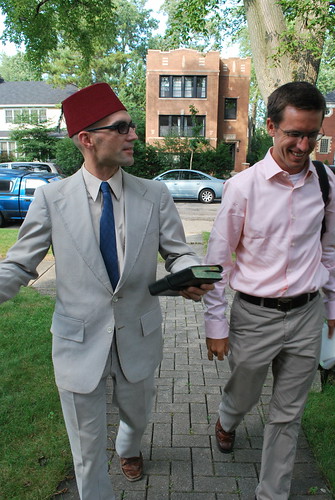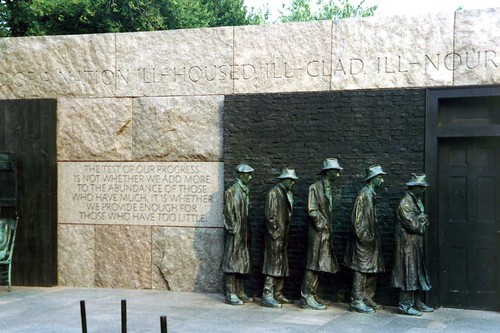The problem with having
a Tumbler annex to this blog is that occasionally when I'm wandering my bookshelves in search of some brief, interesting material to post, I get sucked into reading something I hadn't at all meant to spend my evening with.
That was the case last night, as, flipping through
one of the Library of America's collections of Edmund Wilson's criticism, I started reading a piece from 1947, "A Dissenting Opinion on Kafka." It's ostensibly a review of a couple of volumes of Kafka odds and ends and criticism,
A Franz Kafka Miscellany and
The Kafka Problem; the latter in particular seems to have provoked Wilson. Its forty-one essays and memoirs of Kafka, Wilson writes, "finally give rise to the suspicion that Kafka is being wildly overdone." He continues:
One realizes that it is not merely a question of appreciating Kafka as a poet who gives expression for the intellectuals to their emotions of helplessness and self-contempt but of building him up as a theologian and saint who can somehow also justify for them--or help them to accept without justification--the ways of a banal, bureaucratic and incomprehensible God to sensitive and anxious men.
Leaving aside the swipe at the sensitivity of the critics, smacking as it does of some of the references to masculine toughness that occasionally mar Orwell's criticism, Wilson in that sentence reveals that his argument is more with the critics than with Kafka's work itself: other critics--"cultists," Wilson calls them elsewhere--have made of Kafka a minor deity and the
The Trial and
The Castle "something like sacred writings, finding in them religious implications that Wilson thinks are in reality "practically nil."
All of which is fair enough. Writers need to be rescued from their fans on occasion. But in condemning the too-grand claims made for Kafka, Wilson goes too far himself--"Kafka is impossible to take . . . as a major writer"--ending up trapped in the ways of thinking that he's deriding: he goes looking for explicit meaning in Kafka, and, not finding it--or not finding it in the way he's expecting--ends by dismissing the work:
If, however, one puts Kafka beside writers with whom he may properly be compared, he still seems rather unsatisfactory. Gogol and Poe were equally neurotic, in their destinies they were equally unhappy; and if it is true, as Mr. Savage says [in one of the essays in The Kafka Problem, that there is present in Kafka's world neither personality nor love, there is no love in either Gogol or Poe, and though there are plenty of personalities in Gogol, the actors of Poe, as a rule, are even less characterized than Kafka's. But, though the symbols that these writers generate are just as unpleasant as Kafka's, though, like his, they represent mostly the intense and painful realization of emotional culs-de-sac, yet they have both certain advantages over Kafka--for Gogol was nourished and fortified by his heroic conception or Russia, and Poe, for all his Tory view, is post-Revolutionary American in his challenging, defiant temper, his alert and curious mind. In their ways, they are both tonic. But the denationalized, discouraged, disaffected, disabled Kafka, though for the moment he may frighten or amuse us, can in the end only let us down. he is quite true to his time and place, but it is surely a time and place in which few of us will want to linger--whether as stunned and hypnotized helots of totalitarian states or as citizens of freer societies, who have relapsed into taking Kafka's stories as evidence that God's law and man's purpose are conceived in terms so different that we may as well give up hope of ever identifying the one with the other.
I enjoy Poe, but any analysis that leads to you plumping for him over Kafka is inherently flawed. The problem is that very one of interpretation: Kafka, at his best, is meant to be
experienced rather than analyzed. As the Bible would have it, "The letter killeth, but the spirit giveth life." A freshman lit class can ever-so-painfully drag theme after theme from a reading of
The Trial, and in some sense it's obviously far from inappropriate to do so: part of what keeps that novel alive for people is the ways they can use it to illuminate the contemporary world. But we are not students. We don't have papers due, and reading the book that way, with readers' guide–style questions in mind, strips it of much of its power as a strange work of personal expression, a fever dream that has no applicability to ordinary life, no explanation, because it has left the ordinary world far behind, a dim memory. The very raggedness that Wilson marks in the debit column is a feature when the book--and, even more, its neighbors
The Castle and
Amerika--is read this way: this novel is unfinished because finishing it is impossible, would close off too many possibilities, would trade a pretense of perfection for the inherent raggedness of individual experience. Theseus's bad example aside, we don't usually escape from labyrinths in this life.
That resistance to interpretation is even more true of the shorter fiction, which is what really draws me back to Kafka again and again.Wilson acknowledges that
Some of his short stories are absolutely first-rate, comparable to Gogol's and Poe's. Like them, they are realistic nightmares that embody in concrete imagery the manias of neurotic states.
And those stories are, again, at their best when taken as strange wholes, comprehensible only on their own terms of reference. Here, perfection
does have its place: as a marker of the independent, singular existence of each of these tales.
Take "Blumfeld, an Elderly Bachelor," for instance, with the anxiety of its two jumping balls and the sulky, complicated assistants: read in a rush, it draws you inexorably into the claustrophobia of Blumfeld's world; interpreted, its power seeps out into banality (as is the case with its cousin "Bartleby the Scrivener"). Or the extreme case represented by the brevity of "Give it Up!":
It was very early in the morning, the streets clean and deserted, I was on my way to the station. As I compared the tower clock with my watch I realized it was much later than I had thought and that I had to hurry; the shock of this discovery made me feel uncertain of the way, I wasn't very well acquainted with the town as yet; fortunately, there was a policeman at hand, I ran to him and breathlessly asked him the way. He smiled and said: "You asking me the way?" "Yes," I said, "since I can't find it myself." "Give it up! Give it up!" said he, and turned with a sudden jerk, like someone who wants to be alone with his laughter.
Sure, you could make the policeman the representative of the indifferent modern bureaucratic state, and--but good god, aren't you falling asleep already? And how do you account for the awkwardness of that "sudden jerk," and the impression of solitary laughter? The same goes for "Before the Law," "The Imperial Message," "Fellowship," or any of a dozen other of Kafka's shortest writings. Like dreams, they wither under analysis; like dreams, they offer us hermetic brilliance if we choose to accept them on their own terms.
I realize that such an approach risks abdicating the role of the critic entirely, and I want to be clear that I'm not advocating this position for the vast majority of writers. Kafka, "major" or not, is for me a special case, leading a class of his own whose other members include, on the lighter side, Calvino and the best of Murakami, and on the darker side, say, the Bible and the most inscrutable Greek myths. Halldor Laxness reaches this pitch at times; Steven Millhauser can, too, on occasion, if a bit self-consciously. And surely there are others? (
Zachary Mason, I've got my eye on you!)
I realize, too, that this post is far from an adequate or considered rebuttal of Wilson. I'm taking advantage of the mutability of a blog and responding to Kafka as a reader and a writer rather than a critic, spinning out one evening's thoughts rather than marshaling an argument. Wilson was presenting a viewpoint, a position, an entry in an ongoing conversation about a writer whose reputation was still being developed. I'm giving disjointed impressions spiked with passion. But hybridity and awkwardness seem right for Kafka, leading me to close with this, from "Description of a Struggle":
So we walked on in silence. Listening to the sound of our steps, I couldn't understand why I was incapable of keeping step with my acquaintance--especially since the air was clear and I could see his legs quite plainly. Here and there someone leaned out of a window and watched us.
And, the scene, framed by that window, of two men walking together, awkwardly out of step, conveys no clear meaning; yet the watchers, silent, never forget it.







